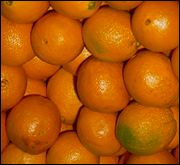Whether you accept it, avoid it or live somewhere in between, insurance coverage has become a defining issue for our profession. Patients increasingly expect to use their benefits, practitioners want to be compensated fairly for their time and expertise, and the system itself remains – at best – fragmented. The encouraging news is that coverage has expanded in meaningful ways. The challenging news is that reimbursement, across the board, remains inadequate.
Herbs & Botanicals
Bitter Orange Peel (ju hong)
What is bitter orange peel? What is it used for?
Bitter orange peel is the dried outer peel of the highly acidic Seville orange, which is grown and cultivated in Spain, Italy and parts of the U.S. The peel has been found to exhibit cholerectic, anti-inflammatory, antibacterial and antifungal properties.
In traditional Chinese medicine, two separate preparations are made using bitter orange peel. Zhi qiao is prepared from the dried peel of a green, immature orange, while zhi shi is prepared from dried fruit. Both forms are used in TCM to treat indigestion and toxic or anaphylactic shock.
 Bitter orange tinctures and extracts are primarily used as tonics. In
Great Britain, bitter orange peel is used to treat heartburn and reduce
muscle spasms. It is also thought to facilitate weight gain by stimulating
the appetite; however, research into this area remains somewhat controversial.
Bitter orange tinctures and extracts are primarily used as tonics. In
Great Britain, bitter orange peel is used to treat heartburn and reduce
muscle spasms. It is also thought to facilitate weight gain by stimulating
the appetite; however, research into this area remains somewhat controversial.
How much bitter orange peel should I take?
The German Commission E recommends 4-6 grams of cut peel per day, which can be used in a tea. Some practitioners recommend taking 1-2 grams of a fluid extract or 2-3 grams of a bitter orange tincture.
What forms of bitter orange peel are available?
Prolonged use of bitter orange peel may lead some people to become highly sensitive to sunlight, especially in fair-skinned individuals. In addition, it should not be used by women during pregnancy or lactation. As of this writing, there are no known drug interactions with bitter orange peel.
What can happen if I take too much bitter orange peel? Are there any interactions I should be aware of? What precautions should I take?
Prolonged use of bitter orange peel may lead some people to become highly sensitive to sunlight, especially in fair-skinned individuals. In addition, it should not be used by women during pregnancy or lactation. As of this writing, there are no known drug interactions with bitter orange peel.
References
- Bown D. Encyclopedia of Herbs and Their Uses. New York: DK Publishing, 1995, pp. 262-63.
- Huang KC. The Pharmacology of Chinese Herbs. Boca Raton: CRC Press, 1993.
- Pei DK. Dissolution of tetained biliary stones with a compound prescription of orange peel emulsion — a clinical analysis of 134 cases. Chung His I Chieh Ho Tsa Chih 1985;5(10):578, 591-94.
- Ramadan W, Mourad B, Ibrahim F, et al. Oil of bitter orange: new topical antifungal agent. Int J Dermatol 1996;35(6):448-49.
- Tang W, Eisenbrand G. Chinese Drugs of Plant Origin: Chemistry, Pharmacology, and Use in Traditional and Modern Medicine. New York: Springer Verlag, 1992.


